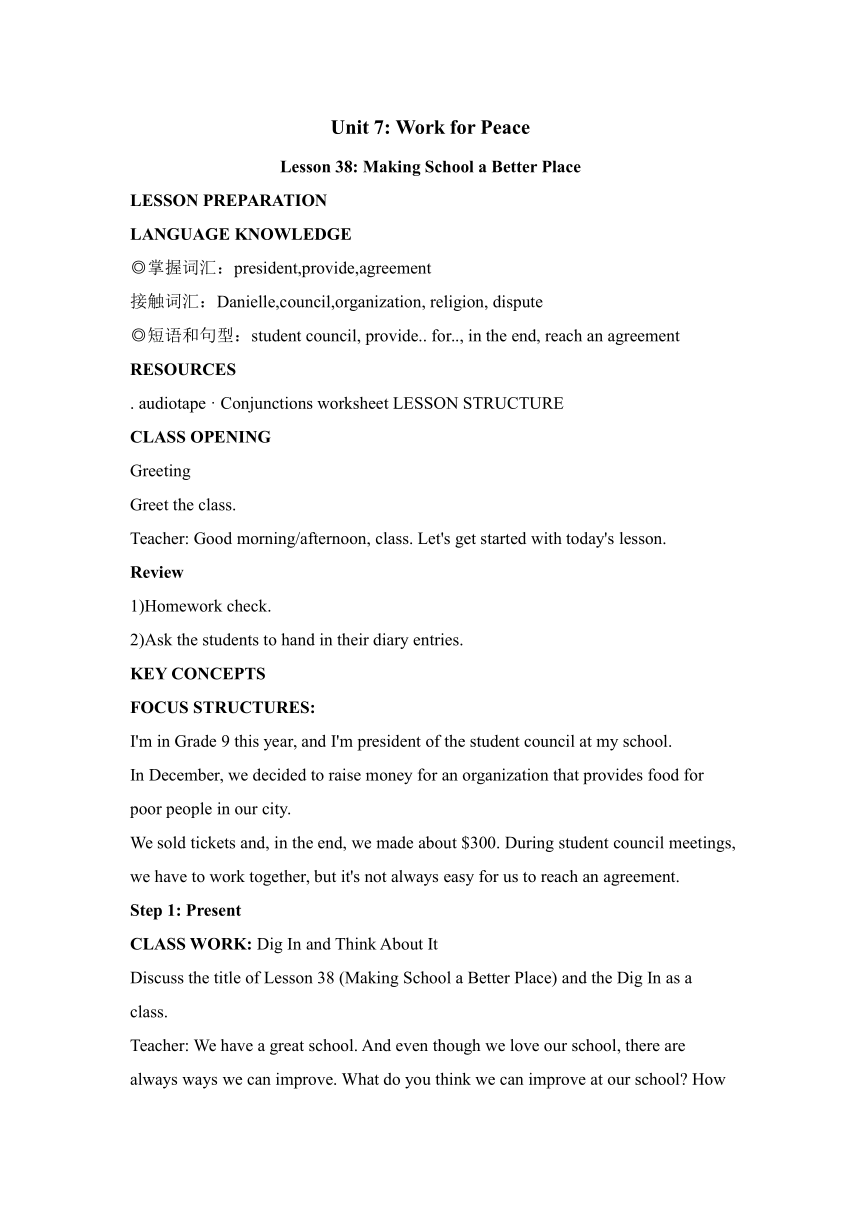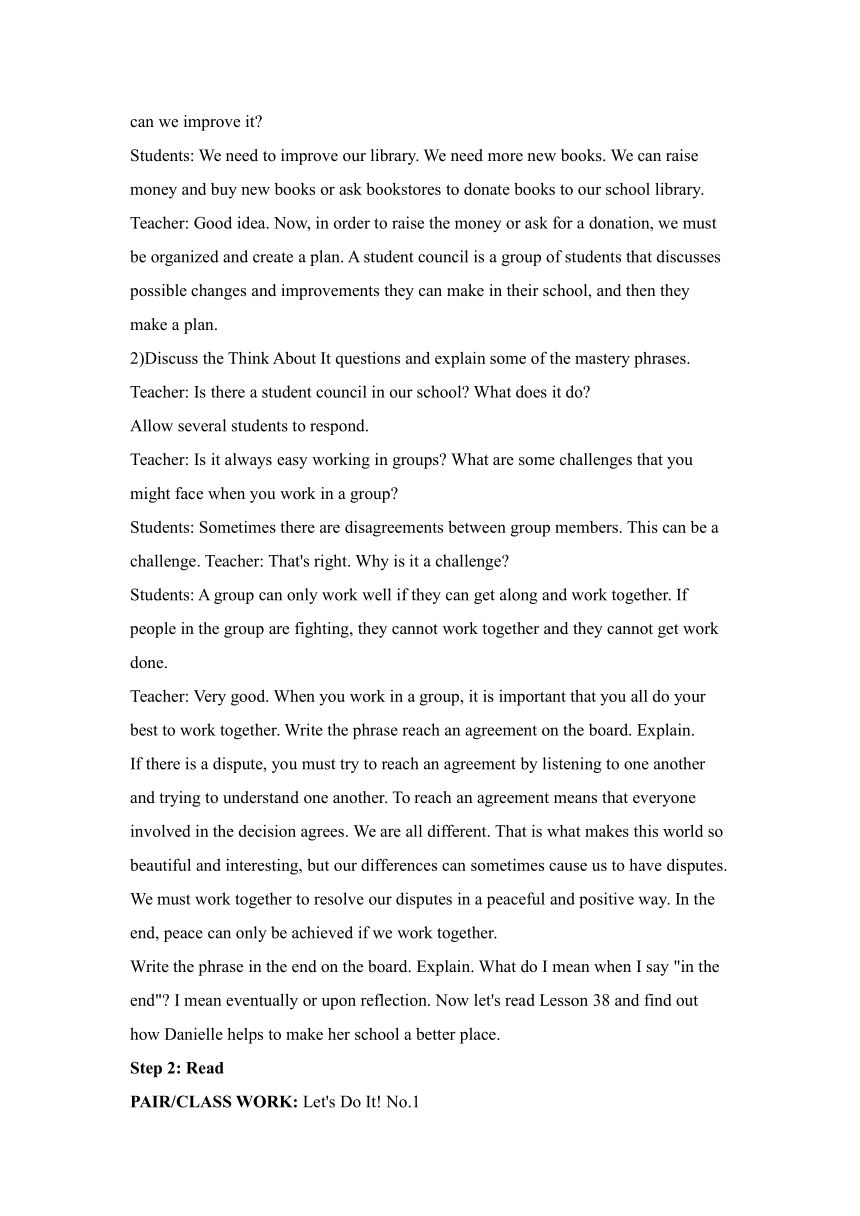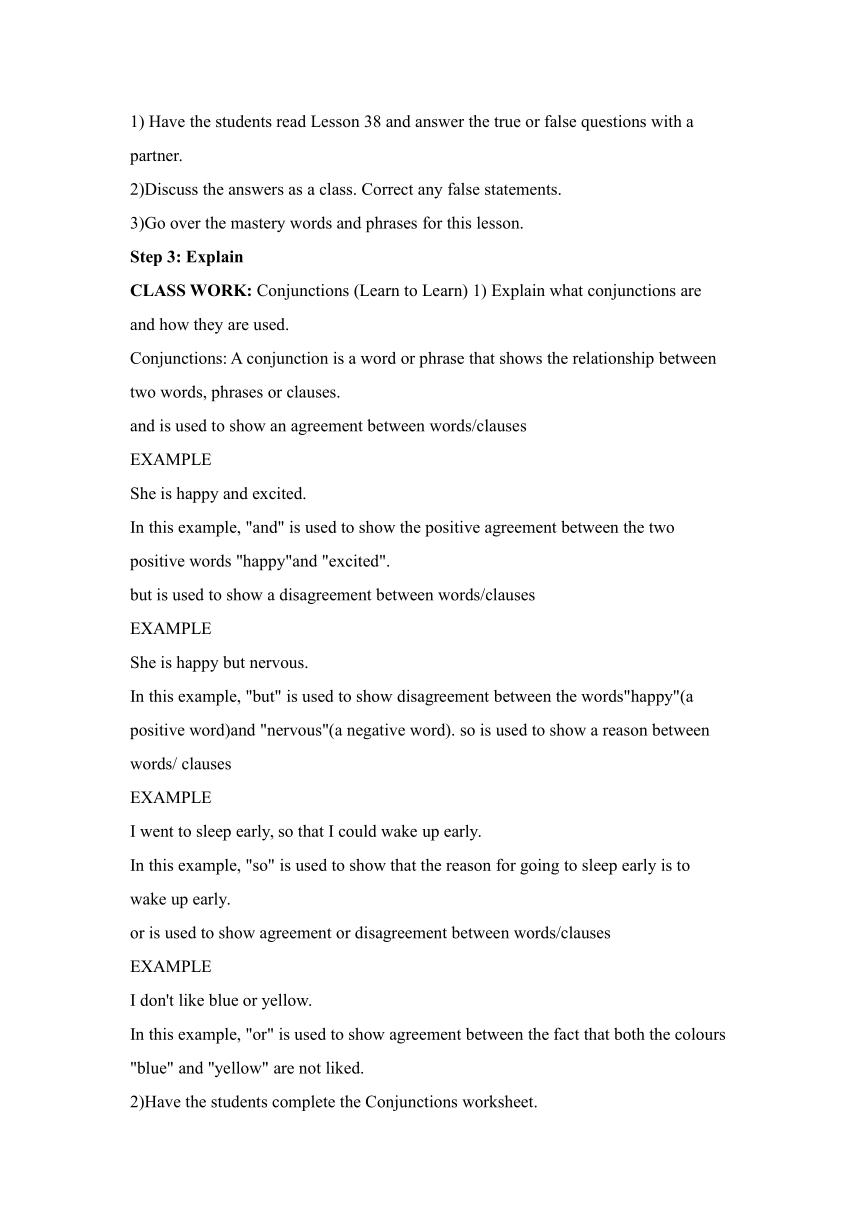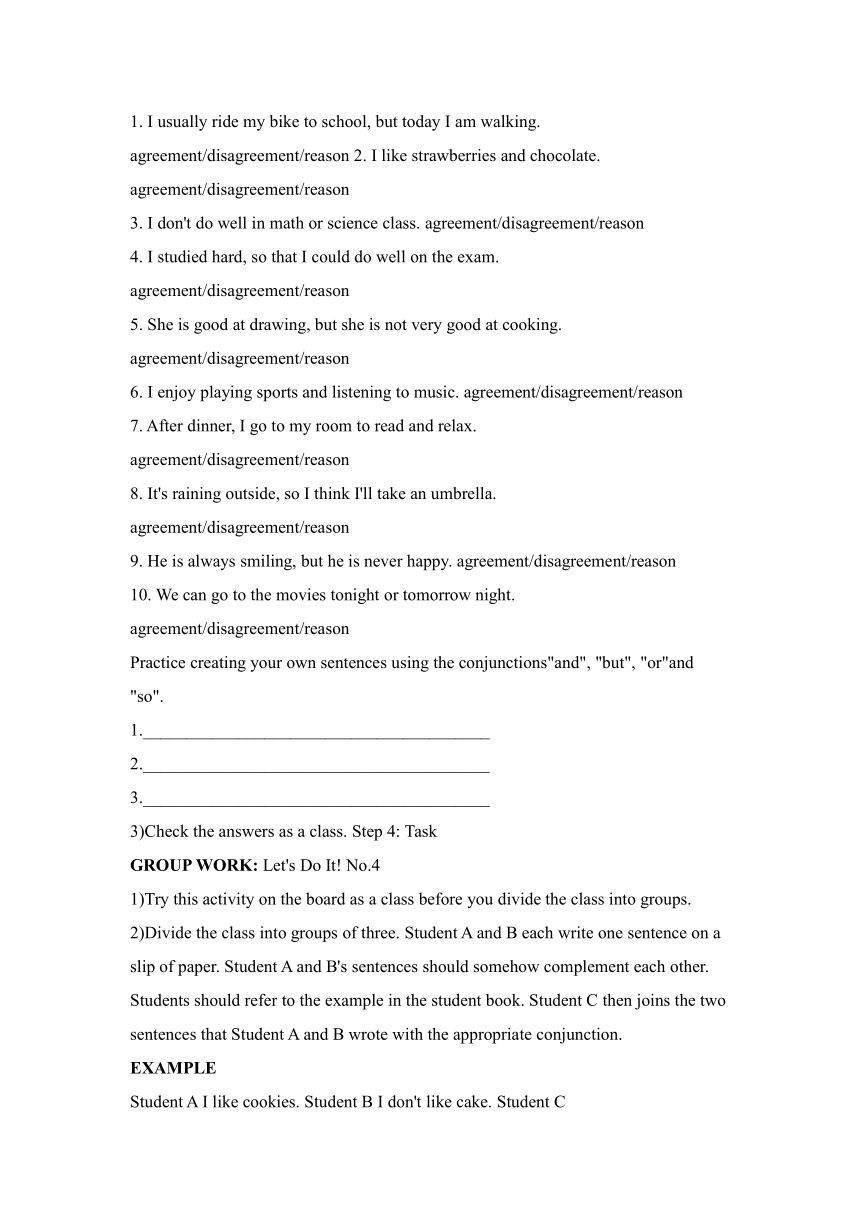冀教版九年级下册Unit 7 Work for Peace Lesson38教案
文档属性
| 名称 | 冀教版九年级下册Unit 7 Work for Peace Lesson38教案 |

|
|
| 格式 | docx | ||
| 文件大小 | 20.3KB | ||
| 资源类型 | 教案 | ||
| 版本资源 | 冀教版 | ||
| 科目 | 英语 | ||
| 更新时间 | 2024-12-20 20:50:05 | ||
图片预览




文档简介
Unit 7: Work for Peace
Lesson 38: Making School a Better Place
LESSON PREPARATION
LANGUAGE KNOWLEDGE
◎掌握词汇:president,provide,agreement
接触词汇:Danielle,council,organization, religion, dispute
◎短语和句型:student council, provide.. for.., in the end, reach an agreement
RESOURCES
. audiotape · Conjunctions worksheet LESSON STRUCTURE
CLASS OPENING
Greeting
Greet the class.
Teacher: Good morning/afternoon, class. Let's get started with today's lesson.
Review
1)Homework check.
2)Ask the students to hand in their diary entries.
KEY CONCEPTS
FOCUS STRUCTURES:
I'm in Grade 9 this year, and I'm president of the student council at my school.
In December, we decided to raise money for an organization that provides food for poor people in our city.
We sold tickets and, in the end, we made about $300. During student council meetings, we have to work together, but it's not always easy for us to reach an agreement.
Step 1: Present
CLASS WORK: Dig In and Think About It
Discuss the title of Lesson 38 (Making School a Better Place) and the Dig In as a class.
Teacher: We have a great school. And even though we love our school, there are always ways we can improve. What do you think we can improve at our school How can we improve it
Students: We need to improve our library. We need more new books. We can raise money and buy new books or ask bookstores to donate books to our school library.
Teacher: Good idea. Now, in order to raise the money or ask for a donation, we must be organized and create a plan. A student council is a group of students that discusses possible changes and improvements they can make in their school, and then they make a plan.
2)Discuss the Think About It questions and explain some of the mastery phrases.
Teacher: Is there a student council in our school What does it do
Allow several students to respond.
Teacher: Is it always easy working in groups What are some challenges that you might face when you work in a group
Students: Sometimes there are disagreements between group members. This can be a challenge. Teacher: That's right. Why is it a challenge
Students: A group can only work well if they can get along and work together. If people in the group are fighting, they cannot work together and they cannot get work done.
Teacher: Very good. When you work in a group, it is important that you all do your best to work together. Write the phrase reach an agreement on the board. Explain.
If there is a dispute, you must try to reach an agreement by listening to one another and trying to understand one another. To reach an agreement means that everyone involved in the decision agrees. We are all different. That is what makes this world so beautiful and interesting, but our differences can sometimes cause us to have disputes. We must work together to resolve our disputes in a peaceful and positive way. In the end, peace can only be achieved if we work together.
Write the phrase in the end on the board. Explain. What do I mean when I say "in the end" I mean eventually or upon reflection. Now let's read Lesson 38 and find out how Danielle helps to make her school a better place.
Step 2: Read
PAIR/CLASS WORK: Let's Do It! No.1
1) Have the students read Lesson 38 and answer the true or false questions with a partner.
2)Discuss the answers as a class. Correct any false statements.
3)Go over the mastery words and phrases for this lesson.
Step 3: Explain
CLASS WORK: Conjunctions (Learn to Learn) 1) Explain what conjunctions are and how they are used.
Conjunctions: A conjunction is a word or phrase that shows the relationship between two words, phrases or clauses.
and is used to show an agreement between words/clauses
EXAMPLE
She is happy and excited.
In this example, "and" is used to show the positive agreement between the two positive words "happy"and "excited".
but is used to show a disagreement between words/clauses
EXAMPLE
She is happy but nervous.
In this example, "but" is used to show disagreement between the words"happy"(a positive word)and "nervous"(a negative word). so is used to show a reason between words/ clauses
EXAMPLE
I went to sleep early, so that I could wake up early.
In this example, "so" is used to show that the reason for going to sleep early is to wake up early.
or is used to show agreement or disagreement between words/clauses
EXAMPLE
I don't like blue or yellow.
In this example, "or" is used to show agreement between the fact that both the colours "blue" and "yellow" are not liked.
2)Have the students complete the Conjunctions worksheet.
1. I usually ride my bike to school, but today I am walking.
agreement/disagreement/reason 2. I like strawberries and chocolate. agreement/disagreement/reason
3. I don't do well in math or science class. agreement/disagreement/reason
4. I studied hard, so that I could do well on the exam.
agreement/disagreement/reason
5. She is good at drawing, but she is not very good at cooking.
agreement/disagreement/reason
6. I enjoy playing sports and listening to music. agreement/disagreement/reason
7. After dinner, I go to my room to read and relax.
agreement/disagreement/reason
8. It's raining outside, so I think I'll take an umbrella.
agreement/disagreement/reason
9. He is always smiling, but he is never happy. agreement/disagreement/reason
10. We can go to the movies tonight or tomorrow night.
agreement/disagreement/reason
Practice creating your own sentences using the conjunctions"and", "but", "or"and "so".
1.________________________________________
2.________________________________________
3.________________________________________
3)Check the answers as a class. Step 4: Task
GROUP WORK: Let's Do It! No.4
1)Try this activity on the board as a class before you divide the class into groups.
2)Divide the class into groups of three. Student A and B each write one sentence on a slip of paper. Student A and B's sentences should somehow complement each other. Students should refer to the example in the student book. Student C then joins the two sentences that Student A and B wrote with the appropriate conjunction.
EXAMPLE
Student A I like cookies. Student B I don't like cake. Student C
I like cookies, and I don't like cake. I like cookies, but I don't like cake.
3)Students should do the exercise a few times until they've each had a turn to be Student A, B and C. 4)Have the students present their final sentences to the class.
CLASS CLOSING 1)Complete Let's Do It! No.3.
Students do the exercise independently. Then check and correct their answers in groups.
2)Assign homework:
Read Lesson 38 and write down all of the sentences in the lesson that use conjunctions. Then indicate whether those conjunctions are to show agreement, disagreement or reason.
Complete Let's Do It! No.2
EXTENSION
CLASS WORK: Spell It
Play Spell It to review any vocabulary and conjunctions.
1) Divide the class into two large teams. Write blanks for any word or phrase across the blackboard (leave space between words in phrases).
2)The teams take turns guessing letters that go in the blanks.
3) You or a volunteer from the class write correct guesses in the correct blanks. A team may guess the word or phrase before all the letters are filled in, but must then correctly spell the entire word or phrase from the beginning. The first team to do this wins. Sample Words and Phrases:
I didn't enjoy the movie, but my mom and my sister did.
Barak Obama is the president of the United States. The two countries made an agreement not to fight anymore.
Animals provide us with food and materials.
* See the "Games"section at the back of this guide for further instructions on how to play.
LANGUAGE NOTES
1. I'm in Grade 9 this year, and I'm president of the student council at my school.今年我上九年级,担 任学校的学生会主席。
表示独一无二的职务的名词前,通常不用冠词。但用这些词指代任职的人时,要用冠词。例如:Who's(the) captain of your team 谁是你们的队 长?
John was elected monitor of the class.约翰被选为 班长。
They elected John (the) chairman of the committee. 他们选约翰当委员会主席。
Mr. Smith asked me to act as interpreter.史密斯要 我当翻译。
Once there lived an old mayor in the city.从前这座 城市里有一位老市长。
The governor visited our village last week.上周州 长参观了我们村。
2. Student councils work to make schools better places to learn.学生会的工作就是使学校成为更好的学习场所。
to learn在句中作places的定语, learn用作不及
物动词。不及物动词的不定形式作定语时,通常搭配适当的介词。例如:
I need a room to live in.我需要一间屋子住。
She has a lot of friends to talk with.她有很多可以 交谈的朋友。
但是,这样的不定式作place的定语时,可以省略介词。例如:
It was very difficult for them to find a place to sleep (in).他们很难找到睡觉的地方。
3. In the council, we share our ideas, interests and concerns with teachers and others.在学生会里,我 们与老师们和其他同学们分享我们的思想、兴趣和事务。
(1) share的意思是“分享”。share还可以表示“与他人共用;允许他人使用;与他人均分某物;与他人共同承担责任或费用;与他人共有相同的经历或观点等 告诉他人自己的观点、秘密或困难”。例如:
Sam and I share a room.山姆和我合住一屋。
We don't have enough books so you'll have to share.
我们没有足够的书,因此,你们要一块看。
The three of us shared a taxi.我们三人搭乘一辆出 租车。
As a kid, he'd never share his toys.小时候,他从 不让别人玩他的玩具。
You don't have to buy a newspaper; you can share mine.你不必买报纸,可以看我的。
They shared the cake between them.他们分了那块 蛋糕。
At his death, his property was shared out between his children.他死后,他的财产由其孩子们平分。We all share some of the blame for the accident.关 于这场事故,我们都难辞其咎。
I believe my view is widely shared.我相信我的观 点能得到广泛认同。
(2)concern 用复数形式,意思是“事务”。例如:Mind your own concerns.别多管闲事。
She is busy with some household concems.她在忙 家务。
4. In December, we decided to raise money for an organization that provides food for poor people in our city.在12月份,我们决定为本市一个给穷人提供食物的组织集资。
(1)表示“为某人提供某物”可以用provide sthfor/to sb.结构,也可以用 provide sb. with sth.结构。
例如:
This restaurant provides good meals for this area.这 家饭店为这个地区供应上好的膳食。
It is our duty to provide aid to them.为他们提供援 助是我们的责任。
Mary provides him with money. 玛丽供给他钱。 (2)that provides food for poor people in our city是 定语从句,修饰 an organization,that在从句中作 主语。例如:
My father works in a factory that produces washing machines.我父亲在一家生产洗衣机的工厂上班。5. We sold tickets and, in the end, we made about $300.我们出售比赛的门票,最后,我们赚了大约300美元。
in the end 和 at the end一样,都可以表示“最终, 最后,结果”。例如:
At/In the end everything was all right.最后一切正 常了。
Although we had many difficulties, we were successful in/at the end.虽然我们困难重重,但终 于还是成功了。
6. I think we should work together towards peace in our schools and in the world.我认为我们应该共同 努力让学校氛围融洽,让世界和平
work toward(s)的意思是“努力达到;设法获得”。例如:
The United Nations is working towards having the two countries sign a peace agreement.联合国正在 努力促成那两个国家签订一项和平协议。
We should work towards a solution as soon as possible.我们应尽快设法找到解决的办法。
7. We need to learn about different countries and make friends with people from other cultures.我们 需要了解不同的国家,与不同文化背景的人交朋友。
learn about 的意思是“知道;了解”。例如:Learning about foreign cultures is very important. 了解外国文化很重要。
Lesson 38: Making School a Better Place
LESSON PREPARATION
LANGUAGE KNOWLEDGE
◎掌握词汇:president,provide,agreement
接触词汇:Danielle,council,organization, religion, dispute
◎短语和句型:student council, provide.. for.., in the end, reach an agreement
RESOURCES
. audiotape · Conjunctions worksheet LESSON STRUCTURE
CLASS OPENING
Greeting
Greet the class.
Teacher: Good morning/afternoon, class. Let's get started with today's lesson.
Review
1)Homework check.
2)Ask the students to hand in their diary entries.
KEY CONCEPTS
FOCUS STRUCTURES:
I'm in Grade 9 this year, and I'm president of the student council at my school.
In December, we decided to raise money for an organization that provides food for poor people in our city.
We sold tickets and, in the end, we made about $300. During student council meetings, we have to work together, but it's not always easy for us to reach an agreement.
Step 1: Present
CLASS WORK: Dig In and Think About It
Discuss the title of Lesson 38 (Making School a Better Place) and the Dig In as a class.
Teacher: We have a great school. And even though we love our school, there are always ways we can improve. What do you think we can improve at our school How can we improve it
Students: We need to improve our library. We need more new books. We can raise money and buy new books or ask bookstores to donate books to our school library.
Teacher: Good idea. Now, in order to raise the money or ask for a donation, we must be organized and create a plan. A student council is a group of students that discusses possible changes and improvements they can make in their school, and then they make a plan.
2)Discuss the Think About It questions and explain some of the mastery phrases.
Teacher: Is there a student council in our school What does it do
Allow several students to respond.
Teacher: Is it always easy working in groups What are some challenges that you might face when you work in a group
Students: Sometimes there are disagreements between group members. This can be a challenge. Teacher: That's right. Why is it a challenge
Students: A group can only work well if they can get along and work together. If people in the group are fighting, they cannot work together and they cannot get work done.
Teacher: Very good. When you work in a group, it is important that you all do your best to work together. Write the phrase reach an agreement on the board. Explain.
If there is a dispute, you must try to reach an agreement by listening to one another and trying to understand one another. To reach an agreement means that everyone involved in the decision agrees. We are all different. That is what makes this world so beautiful and interesting, but our differences can sometimes cause us to have disputes. We must work together to resolve our disputes in a peaceful and positive way. In the end, peace can only be achieved if we work together.
Write the phrase in the end on the board. Explain. What do I mean when I say "in the end" I mean eventually or upon reflection. Now let's read Lesson 38 and find out how Danielle helps to make her school a better place.
Step 2: Read
PAIR/CLASS WORK: Let's Do It! No.1
1) Have the students read Lesson 38 and answer the true or false questions with a partner.
2)Discuss the answers as a class. Correct any false statements.
3)Go over the mastery words and phrases for this lesson.
Step 3: Explain
CLASS WORK: Conjunctions (Learn to Learn) 1) Explain what conjunctions are and how they are used.
Conjunctions: A conjunction is a word or phrase that shows the relationship between two words, phrases or clauses.
and is used to show an agreement between words/clauses
EXAMPLE
She is happy and excited.
In this example, "and" is used to show the positive agreement between the two positive words "happy"and "excited".
but is used to show a disagreement between words/clauses
EXAMPLE
She is happy but nervous.
In this example, "but" is used to show disagreement between the words"happy"(a positive word)and "nervous"(a negative word). so is used to show a reason between words/ clauses
EXAMPLE
I went to sleep early, so that I could wake up early.
In this example, "so" is used to show that the reason for going to sleep early is to wake up early.
or is used to show agreement or disagreement between words/clauses
EXAMPLE
I don't like blue or yellow.
In this example, "or" is used to show agreement between the fact that both the colours "blue" and "yellow" are not liked.
2)Have the students complete the Conjunctions worksheet.
1. I usually ride my bike to school, but today I am walking.
agreement/disagreement/reason 2. I like strawberries and chocolate. agreement/disagreement/reason
3. I don't do well in math or science class. agreement/disagreement/reason
4. I studied hard, so that I could do well on the exam.
agreement/disagreement/reason
5. She is good at drawing, but she is not very good at cooking.
agreement/disagreement/reason
6. I enjoy playing sports and listening to music. agreement/disagreement/reason
7. After dinner, I go to my room to read and relax.
agreement/disagreement/reason
8. It's raining outside, so I think I'll take an umbrella.
agreement/disagreement/reason
9. He is always smiling, but he is never happy. agreement/disagreement/reason
10. We can go to the movies tonight or tomorrow night.
agreement/disagreement/reason
Practice creating your own sentences using the conjunctions"and", "but", "or"and "so".
1.________________________________________
2.________________________________________
3.________________________________________
3)Check the answers as a class. Step 4: Task
GROUP WORK: Let's Do It! No.4
1)Try this activity on the board as a class before you divide the class into groups.
2)Divide the class into groups of three. Student A and B each write one sentence on a slip of paper. Student A and B's sentences should somehow complement each other. Students should refer to the example in the student book. Student C then joins the two sentences that Student A and B wrote with the appropriate conjunction.
EXAMPLE
Student A I like cookies. Student B I don't like cake. Student C
I like cookies, and I don't like cake. I like cookies, but I don't like cake.
3)Students should do the exercise a few times until they've each had a turn to be Student A, B and C. 4)Have the students present their final sentences to the class.
CLASS CLOSING 1)Complete Let's Do It! No.3.
Students do the exercise independently. Then check and correct their answers in groups.
2)Assign homework:
Read Lesson 38 and write down all of the sentences in the lesson that use conjunctions. Then indicate whether those conjunctions are to show agreement, disagreement or reason.
Complete Let's Do It! No.2
EXTENSION
CLASS WORK: Spell It
Play Spell It to review any vocabulary and conjunctions.
1) Divide the class into two large teams. Write blanks for any word or phrase across the blackboard (leave space between words in phrases).
2)The teams take turns guessing letters that go in the blanks.
3) You or a volunteer from the class write correct guesses in the correct blanks. A team may guess the word or phrase before all the letters are filled in, but must then correctly spell the entire word or phrase from the beginning. The first team to do this wins. Sample Words and Phrases:
I didn't enjoy the movie, but my mom and my sister did.
Barak Obama is the president of the United States. The two countries made an agreement not to fight anymore.
Animals provide us with food and materials.
* See the "Games"section at the back of this guide for further instructions on how to play.
LANGUAGE NOTES
1. I'm in Grade 9 this year, and I'm president of the student council at my school.今年我上九年级,担 任学校的学生会主席。
表示独一无二的职务的名词前,通常不用冠词。但用这些词指代任职的人时,要用冠词。例如:Who's(the) captain of your team 谁是你们的队 长?
John was elected monitor of the class.约翰被选为 班长。
They elected John (the) chairman of the committee. 他们选约翰当委员会主席。
Mr. Smith asked me to act as interpreter.史密斯要 我当翻译。
Once there lived an old mayor in the city.从前这座 城市里有一位老市长。
The governor visited our village last week.上周州 长参观了我们村。
2. Student councils work to make schools better places to learn.学生会的工作就是使学校成为更好的学习场所。
to learn在句中作places的定语, learn用作不及
物动词。不及物动词的不定形式作定语时,通常搭配适当的介词。例如:
I need a room to live in.我需要一间屋子住。
She has a lot of friends to talk with.她有很多可以 交谈的朋友。
但是,这样的不定式作place的定语时,可以省略介词。例如:
It was very difficult for them to find a place to sleep (in).他们很难找到睡觉的地方。
3. In the council, we share our ideas, interests and concerns with teachers and others.在学生会里,我 们与老师们和其他同学们分享我们的思想、兴趣和事务。
(1) share的意思是“分享”。share还可以表示“与他人共用;允许他人使用;与他人均分某物;与他人共同承担责任或费用;与他人共有相同的经历或观点等 告诉他人自己的观点、秘密或困难”。例如:
Sam and I share a room.山姆和我合住一屋。
We don't have enough books so you'll have to share.
我们没有足够的书,因此,你们要一块看。
The three of us shared a taxi.我们三人搭乘一辆出 租车。
As a kid, he'd never share his toys.小时候,他从 不让别人玩他的玩具。
You don't have to buy a newspaper; you can share mine.你不必买报纸,可以看我的。
They shared the cake between them.他们分了那块 蛋糕。
At his death, his property was shared out between his children.他死后,他的财产由其孩子们平分。We all share some of the blame for the accident.关 于这场事故,我们都难辞其咎。
I believe my view is widely shared.我相信我的观 点能得到广泛认同。
(2)concern 用复数形式,意思是“事务”。例如:Mind your own concerns.别多管闲事。
She is busy with some household concems.她在忙 家务。
4. In December, we decided to raise money for an organization that provides food for poor people in our city.在12月份,我们决定为本市一个给穷人提供食物的组织集资。
(1)表示“为某人提供某物”可以用provide sthfor/to sb.结构,也可以用 provide sb. with sth.结构。
例如:
This restaurant provides good meals for this area.这 家饭店为这个地区供应上好的膳食。
It is our duty to provide aid to them.为他们提供援 助是我们的责任。
Mary provides him with money. 玛丽供给他钱。 (2)that provides food for poor people in our city是 定语从句,修饰 an organization,that在从句中作 主语。例如:
My father works in a factory that produces washing machines.我父亲在一家生产洗衣机的工厂上班。5. We sold tickets and, in the end, we made about $300.我们出售比赛的门票,最后,我们赚了大约300美元。
in the end 和 at the end一样,都可以表示“最终, 最后,结果”。例如:
At/In the end everything was all right.最后一切正 常了。
Although we had many difficulties, we were successful in/at the end.虽然我们困难重重,但终 于还是成功了。
6. I think we should work together towards peace in our schools and in the world.我认为我们应该共同 努力让学校氛围融洽,让世界和平
work toward(s)的意思是“努力达到;设法获得”。例如:
The United Nations is working towards having the two countries sign a peace agreement.联合国正在 努力促成那两个国家签订一项和平协议。
We should work towards a solution as soon as possible.我们应尽快设法找到解决的办法。
7. We need to learn about different countries and make friends with people from other cultures.我们 需要了解不同的国家,与不同文化背景的人交朋友。
learn about 的意思是“知道;了解”。例如:Learning about foreign cultures is very important. 了解外国文化很重要。
同课章节目录
- Unit 7 Work for Peace
- Lesson 37 Don't Fight!
- Lesson 38 Making School a Better Place
- Lesson 39 The Dove and the Olive Branch
- Lesson 40 The UN—Power of Words
- Lesson 41 Jenny's Good Advice
- Lesson 42 Peace at Last
- Unit Review
- Unit 8 Culture Shapes Us
- Lesson 43 A Visit to Chinatown
- Lesson 44 Popular Sayings
- Lesson 45 Different Manners
- Lesson 46 Home to Many Cultures
- Lesson 47 Good Manners
- Lesson 48 Supper with the Bradshaws
- Unit Review
- Unit 9 Communication
- Lesson 49 Get Along with Others
- Lesson 50 Tips for Good Communication
- Lesson 51 What Could Be Wrong?
- Lesson 52 The Power of a Smile
- Lesson 53 Working in Groups
- Lesson 54 How Embarrassing!
- Unit Review
- Unit 10 Get Ready for the Future
- Lesson 55 Look into the Future
- Lesson 56 Manage Your Time
- Lesson 57 Best Wishes
- Lesson 58 Ms.Liu's Speech
- Lesson 59 Keep Your Choices Open
- Lesson 60 Get a Good Education
- Unit Review
